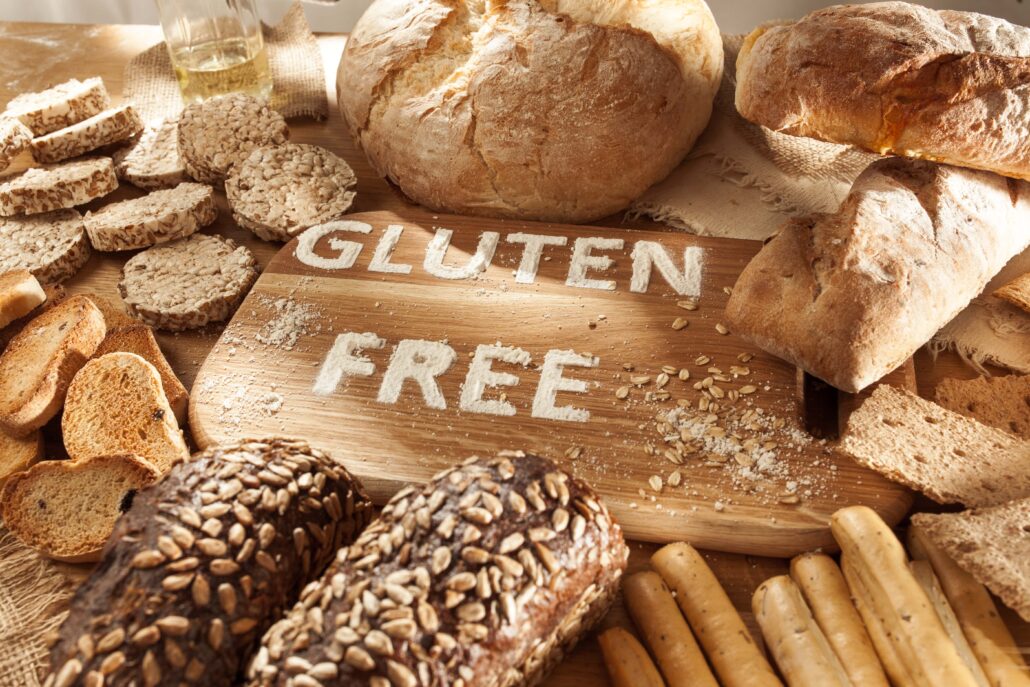Introduction

In recent years, the gluten-free diet has become a hot topic, popping up on health blogs, social media feeds, and even restaurant menus. But with the buzz comes a lot of confusion and misinformation. Are gluten-free products really healthier? Is going gluten-free a magic bullet for weight loss? Let’s dive into the myths surrounding gluten-free living and separate fact from fiction.
What is Gluten?
Definition and Sources
Gluten is a protein found primarily in wheat, barley, and rye. It’s what gives dough its elasticity and helps it rise. Imagine gluten as the secret ingredient that makes bread chewy and pizza crust crispy. For most people, gluten is perfectly harmless, but for those with specific health conditions, it can cause significant issues.
Gluten in the Food Chain
Gluten is more prevalent in our food supply than many realize. It’s not just in bread and pasta; it’s also in sauces, soups, and even some processed snacks. Understanding where gluten hides can help those with sensitivities navigate their diet more effectively.
Why the Gluten-Free Trend?
Rise of the Gluten-Free Diet
The gluten-free trend has surged in popularity, often championed by celebrities and influencers. Some people adopt a gluten-free diet to feel healthier or to avoid perceived negative effects of gluten. While it’s vital for those with celiac disease or gluten sensitivity, others might jump on the bandwagon without understanding the full implications.
Health and Lifestyle Influences
The growing awareness of gluten-related disorders has led to a more significant focus on gluten-free diets. Lifestyle changes, health blogs, and wellness trends contribute to the increasing number of people trying out gluten-free eating, often without a clear medical need.
Myth 1: Gluten-Free Equals Healthier

Nutritional Comparisons
Not all gluten-free foods are created equal. While some people assume that gluten-free products are inherently healthier, this isn’t always the case. Many gluten-free items are processed and may contain higher levels of sugar, fat, and additives to make up for the lack of gluten. For instance, a gluten-free cookie might be just as indulgent as its gluten-filled counterpart.
Misconceptions About Gluten-Free Ingredients
There’s a common belief that gluten-free ingredients are automatically better for you. However, gluten-free does not necessarily mean nutrient-rich. Many gluten-free products use substitutes like tapioca starch or potato flour, which can be low in essential nutrients and high in empty calories.
Health Benefits and Risks
When Gluten-Free is Necessary
For those with celiac disease or severe gluten intolerance, avoiding gluten is crucial. Celiac disease is an autoimmune disorder where ingesting gluten causes damage to the small intestine. For these individuals, a gluten-free diet is not just a choice but a medical necessity.
Potential Downsides
For those without gluten sensitivity, a gluten-free diet may not offer any significant health benefits. In fact, it can sometimes lead to deficiencies in essential nutrients like fiber, iron, and B vitamins if not carefully managed.
Myth 2: Gluten-Free is the Best Way to Lose Weight
Weight Loss and Gluten-Free Diets
There’s no evidence that gluten-free diets are superior for weight loss. Many people mistakenly believe that simply cutting out gluten will lead to weight loss. However, weight management is more about the overall quality of your diet and calorie control than the presence or absence of gluten.
The Role of Gluten in Weight Management
Gluten itself is not a weight loss culprit. Losing weight is about balancing calories and maintaining a healthy diet, not just avoiding gluten. Gluten-free products can be just as calorie-dense as those containing gluten, and focusing solely on eliminating gluten won’t necessarily lead to weight loss.
Healthy Weight Loss Strategies
Balanced Diet and Exercise
The best way to lose weight remains a combination of a balanced diet and regular exercise. Rather than focusing on gluten-free eating, prioritize a diet rich in fruits, vegetables, lean proteins, and whole grains, coupled with physical activity.
Long-Term Weight Management Tips
For sustainable weight management, focus on creating a healthy lifestyle that includes mindful eating and consistent exercise. Gluten-free eating should be seen as part of a broader approach to health, rather than a quick fix for weight loss.
Myth 3: Gluten-Free Diets are Always Nutritious
The Nutritional Value of Gluten-Free Foods
Not all gluten-free foods are nutritious. Many are highly processed and lack essential nutrients. While some gluten-free products are fortified, others can be low in fiber and protein. Choosing whole, naturally gluten-free foods like fruits, vegetables, and lean proteins is a better approach.
Common Nutritional Deficiencies
A gluten-free diet can sometimes lead to deficiencies in important nutrients, such as fiber, iron, and B vitamins. Without whole grains, which are typically high in these nutrients, it’s crucial to find alternative sources to maintain nutritional balance.
Evaluating Gluten-Free Food Labels
When selecting gluten-free products, be vigilant about reading labels. Look for options that are high in fiber and protein and free from excessive sugars and additives. Understanding food labels can help you make healthier choices and avoid nutrient gaps.
Ensuring a Balanced Gluten-Free Diet
Essential Nutrients to Include
To maintain a balanced diet, include a variety of naturally gluten-free foods that are rich in nutrients. Incorporate fruits, vegetables, lean proteins, and gluten-free whole grains like quinoa and brown rice into your meals.
Alternatives for Common Deficiencies
If you’re concerned about nutrient deficiencies, consider incorporating fortified gluten-free products or supplements. Consulting a nutritionist can also help you design a diet that meets all your nutritional needs.
Myth 4: Gluten-Free Products are Free of Additives
Understanding Additives in Gluten-Free Foods
Gluten-free products often contain additives to replace the texture and binding properties that gluten provides. These additives can sometimes be as unhealthy as gluten itself, especially if consumed in large quantities.
Common Additives and Their Purposes
Additives like xanthan gum and guar gum are commonly used in gluten-free products to improve texture. While these ingredients are generally safe, they can cause digestive issues for some people if consumed excessively.
How to Identify Additives on Labels
Be mindful of what’s in your gluten-free foods. To avoid unwanted additives, check ingredient lists and opt for products with fewer and more recognizable ingredients. Choosing whole, natural foods can help you avoid unnecessary chemicals.
Choosing Natural and Whole Foods
Benefits of Whole Foods
Whole, unprocessed foods are naturally gluten-free and free from additives. Eating a diet rich in fruits, vegetables, and lean proteins not only supports overall health but also helps you avoid the pitfalls of processed gluten-free products.
Tips for Minimizing Additives
Minimize additives by focusing on home-cooked meals using fresh ingredients. When buying packaged foods, look for those with minimal additives and avoid products with artificial colors and preservatives.
Myth 5: Gluten-Free Diets are a Fad
The Science Behind Gluten Sensitivity
Gluten sensitivity and celiac disease are well-documented medical conditions. Celiac disease is an autoimmune disorder that causes the immune system to attack the small intestine when gluten is consumed. Gluten sensitivity, while less understood, also causes adverse reactions in some people.
Research and Medical Perspectives
Scientific research supports the need for gluten-free diets for individuals with celiac disease and gluten sensitivity. While the diet may be trendy, it is firmly grounded in medical necessity for those affected by these conditions.
The Longevity of Gluten-Free Diets
Historical Context and Modern Trends
Gluten-free eating is not a new phenomenon. People with celiac disease have been following gluten-free diets for decades. The trend has gained visibility recently due to increased awareness and media coverage, but it has a long history in medical practice.
The Future of Gluten-Free Living
As awareness and research continue to grow, the gluten-free diet will likely evolve. Future advancements may provide better management tools and more options for those who need to avoid gluten, making it easier to maintain a healthy, balanced diet.
Final Thoughts on Gluten-Free Myths
Understanding the realities of gluten-free living is crucial for making informed dietary choices. While gluten-free diets are essential for some, they are not necessarily healthier or more effective for everyone. By focusing on balanced, nutrient-rich foods and debunking myths, you can navigate your diet more effectively.
FAQs
What are the symptoms of gluten sensitivity?
Symptoms of gluten sensitivity can include bloating, abdominal pain, and diarrhea. Unlike celiac disease, gluten sensitivity does not damage the small intestine but can still cause discomfort.
Can a gluten-free diet help with digestive issues?
A gluten-free diet can alleviate symptoms for those with celiac disease or gluten intolerance. For others, it may not have a significant impact on digestive health.
Are gluten-free products always more expensive?
Gluten-free products can be more costly due to specialized ingredients and processing. However, focusing on naturally gluten-free foods like fruits and vegetables can be more budget-friendly.
How can I ensure a balanced diet on a gluten-free plan?
To ensure a balanced diet, include a variety of naturally gluten-free foods that are rich in nutrients. Consulting a nutritionist can help you address any potential nutrient gaps.
Is gluten-free eating necessary for everyone?
No, gluten-free eating is only necessary for those with celiac disease or gluten sensitivity. For most people, a balanced diet that includes gluten is
perfectly healthy.
By understanding these myths and truths, you can make better decisions about whether a gluten-free diet is right for you.
